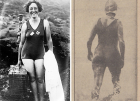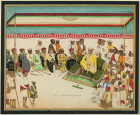World
The modern world cannot be studied without examining the course, impact and legacy of two world wars, the resources in this section set out to look at both the First and Second World Wars in their global context. The section also includes the Cold War and its impact in Latin America, South-East Asia and parts of Africa. This period also sees the rise and fall of European imperialism and the changing nature of global politics and economics as technology brings different stories from so many parts of the world directly to us. Read more
Sort by:
Date (Newest first) | Title A-Z
Show:
All |
Articles |
Podcasts |
Multipage Articles
-

Film: Yeltsin and the West
ArticleClick to view -

Film: Yeltsin's second term and legacy
ArticleClick to view -

Film: Yeltsin and the Oligarchs
ArticleClick to view -

Film: Yeltsin's agenda
ArticleClick to view -

Film: Yeltsin and Russia in the late 1980s
ArticleClick to view -

Film: Yeltsin - Early Life
ArticleClick to view -

Film: Stalin - Interpretations and Legacy
ArticleClick to view -

Film: Stalin - World War II
ArticleClick to view -

Film: Stalin & the Great Terror
ArticleClick to view -

Film: Stalin - The Early Soviet Economy & the preparation for war
ArticleClick to view -

Film: Stalin - Rise to Power
ArticleClick to view -

Film: Stalin - Early Life
ArticleClick to view -

Why White Liberals Fail: United States politics in an election year
ArticleClick to view -

Writing Lilian Harrison into history
ArticleClick to view -

Real Lives: Maharaja’s German: Anthony Pohlmann in India
ArticleClick to view -

Films: Mikhail Gorbachev – Interpretations
ArticleClick to view -

Film: Gorbachev - Interpretations
ArticleClick to view -

Film: Gorbachev - Downfall
ArticleClick to view -

Film: Gorbachev - Foreign Relations
ArticleClick to view -

Film: Gorbachev - Domestic Reform
ArticleClick to view

